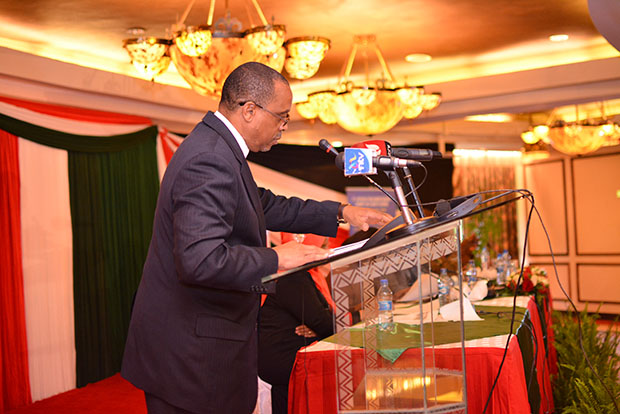
CWS President and CEO the Rev. John L. McCullough speaks at the Pan African Summit on Climate Change in Nairobi, Kenya. Photo: Christian Aid.
Two weeks ago, I addressed representatives from all over Anglophone Africa: parliamentarians, ministers of the environment, faith leaders and civil society leaders. The occasion was the Pan African Summit on Climate Change which took place in Nairobi, Kenya. I was there in my capacity as the US Ambassador for the ACT Alliance Climate Change Campaign. We had gathered in advance of the critical international negotiations that will soon commence in Paris, whose outcomes will be vital to Africa’s future development and economic, social – even political strategies. This was also a wonderful opportunity for me to be back on African soil; to strengthen alliances with African brothers and sisters, listen to their stories about how changing weather patterns are affecting them, and to share reflections on how together we can face our common challenge.
Africa is particularly vulnerable to the damage caused by global warming. Its geographical landscapes, food production capacity, rainfall patterns, flora and fauna are already being transformed. In the Sahel, increasing desertification has damaged as much as ¾ of available arable land. Reduced rainfall has resulted in increased food insecurity in much of West Africa especially Togo, Benin, and Nigeria. In Senegal and Chad, drought has prevented farmers from planting crops. The Horn of Africa has become progressively drier in the last 100 years, while across Ethiopia, Somalia and Kenya, 12 million people today remain food insecure. Across many of these countries, hundreds of wells have dried up, causing women and girls, upon whom falls the responsibility for gathering water, to go further and further, putting their own security at risk. Families, particularly those who farm, are going into debt just to feed their children. There are also broader considerations for African economies: The International Panel on Climate Change believes that as many as up to 30% of the natural species it has analyzed are at risk of extinction because of increasing global temperatures. For countries dependent on trade and tourism, such as Kenya, this has worrying implications.
None of this is inevitable, of course. Adapting to climate change remains entirely within reach of even the least developed African countries. Low carbon technologies, fueled by non fossil fuels, are increasingly affordable. African small business and markets are at the ready with low cost to solar based energy solutions; more investors can soon follow. Church World Service itself, by accompanying dozens of small community based organizations around the continent, is giving much needed seed money for such innovative projects. Across the continent, dozens of worthy projects like these have already been initiated. They need to be scaled up in order to stem the extent of climate damage. Existing initiatives also need to be fully integrated into Africa’s other sustainable development, and anti-poverty objectives, now enshrined in the UN’s Sustainable Development Goals. In order to do this, African countries are going to need considerable financial and technical assistance. Indeed, a majority of world leaders, rich and poor, already agree to this and have started to make such funding available.
This is why I remained so concerned about recent House and Senate initiatives aimed at preventing the Administration to commit $500 million to Green Climate Fund in 2016, and $3 billion in all over the next few years. An independent international organization, the GCF will support transition to low carbon and climate resilient strategies for the world’s poorest nations. 50% of their funds will scale up adaptation strategies of precisely those African countries whose representatives I recently met. This means money for programs that increase access to low cost solar technology, develop warning systems, design safe water and management infrastructure and for reforestation programs. On moral grounds alone, the United States Congress should fully commit to supporting the GCF; but supporting the GCF also makes good economic sense. US tax dollars spent now to help countries prevent, adapt and prepare, will save the treasury millions of dollars later in emergency response and relief.
Climate finance and pathways to low a carbon, sustainable development model, is at the top of Climate Change Summit which begins in Paris in just a few days. I will be there, both as member of the ACT Alliance team, and as a member of the US faith contingent. Together, we will encourage our US negotiators have the highest possible ambitions and urge for decisive United States leadership. Global warming is the biggest development challenge of our time. We will speak for the good of our African colleagues I met in Nairobi, and for us all.
The Rev. John L. McCullough is the President and CEO of CWS.
